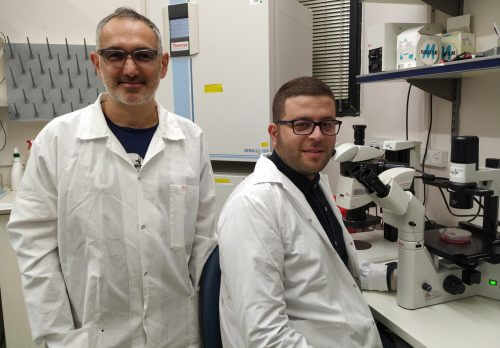The method marks the dangerous cells that show resistance to existing chemotherapy treatments and may cause the disease to return, and promotes the possibility of personalized treatment * The study was recently published in the journal Leukemia

Researchers at Tel Aviv University, led by Dr. Michael Miliavsky from the Faculty of Medicine, developed a method to identify the most dangerous blood cancer cells - the stem cells that produce the rest of the diseased cells, and show resistance to conventional chemotherapy treatments. In addition, they discovered that a potential drug called fenartinide is particularly effective in destroying those cells under laboratory conditions. The significance of the findings: an important step on the way to eliminating blood cancer-causing cells and preventing the recurrence of the disease in patients who have apparently recovered.
The research was conducted by PhD student Muhammad Yassin in Dr. Miliavski's laboratory, in collaboration with laboratories at the University of Toronto and Harvard University. The article was recently published in the scientific journal Leukemia.
"We know that cancerous tumors in general, and blood cancer in particular, consist of a mixture of different types of cells," explains Dr. Miliavski. "The vast majority of these cells are not dangerous, but some of them have properties of stem cells whose function is to produce other cells, and they are the ones that actually cause the disease. It is important to note that even in the blood of a healthy person there are stem cells, which produce a huge amount of normal blood cells (10 to the power of 11 cells per day) in order to replace dead cells and replenish the stock. But if we return to the cancer stem cells, these are rare cells that show resistance to conventional chemotherapy treatments, and therefore may survive even when the patient is apparently cured, and reproduce the disease. In our research, we looked for a way to identify and mark blood cancer stem cells, with the aim of isolating them and studying their mechanisms of action, as a step on the way to finding effective treatments."
Initially, the researchers scanned the human genome, and found several DNA segments that are active in healthy blood stem cells. Then they examined the same segments in blood cancer cells, and discovered increased activity in one of them. Now they have isolated and characterized the same section in the cancer DNA, and found that it is a section of the type called an enhancer - a DNA section that binds to it specific proteins that are especially active in stem cells. To the segment they attached a fluorescent protein - which glows when it connects to the active bone. In doing so, the researchers actually engineered a genetic sensor that identifies cancer stem cells - the only ones that contain the segment in its active state.
"We inserted the fluorescent sensor into several samples of blood cancer cells taken from patients, and found that it glowed in a small population of cells," says Dr. Miliavski. "We have now isolated the glowing cells, and compared them to other cells from the samples, to identify what makes them unique. The findings revealed that the glowing cells, that is, the cancer stem cells, are more resistant to chemotherapy, and even cause the disease in a much more efficient way when they are transplanted into model mice lacking an immune system."
The researchers were not satisfied with this, and decided to examine the effect of several molecules considered to be potential cancer drugs, on the stem cells isolated from the blood cancer. They found that a particular molecule called fenretinide, which has low toxicity to healthy cells, is particularly toxic to blood cancer stem cells.
"Our findings may serve as a basis for developing an effective and targeted drug for blood cancer stem cells, which often survive standard chemotherapy treatments," concludes Dr. Miliavski. "Destroying these cells will greatly reduce the chance that the disease will return. Also, the method we developed for isolating cancer stem cells may promote personalized medicine approaches in the future: with the help of our fluorescent sensor, it will be possible to isolate cancer stem cells in the blood of a particular patient, learn about their properties, and tailor a more effective treatment to that patient."

2 תגובות
09-07-2020
BSD
Innovative treatment for blood and breast cancer
My name is Yosef Adri MA
I am neither a doctor nor a researcher
I work in programming programmable controllers and teach electricity
I have a thesis for several years on the topic of innovative treatment for blood and breast cancer
Unfortunately for every place I turned to I was negatively seated for a meeting without hearing
of my thesis.
Interested in meeting with a reliable researcher who is open to ideas for presenting the thesis.
Of course it must be supported by a legal document for a confidentiality agreement.
Best regards
Yosef Adri
052-6129750
yossi_ed1@bezeqint.net
Chemotherapy is the most primitive and dangerous method against cancer. A custom modern alternative must be found
Good Day .